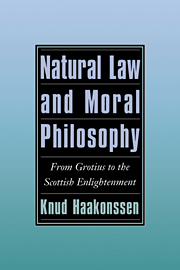Book contents
- Frontmatter
- Contents
- Acknowledgements
- Introduction: The Scottish Enlightenment in the history of ideas
- 1 Natural law in the seventeenth century
- 2 Natural law and moral realism: The civic humanist synthesis in Francis Hutcheson and George Turnbull
- 3 Between superstition and enthusiasm: David Hume's theory of justice, government, and politics
- 4 Adam Smith out of context: His theory of rights in Prussian perspective
- 5 John Millar and the science of a legislator
- 6 Thomas Reid's moral and political philosophy
- 7 Dugald Stewart and the science of a legislator
- 8 The science of a legislator in James Mackintosh's moral philosophy
- 9 James Mill and Scottish moral philosophy
- 10 From natural law to the rights of man: A European perspective on American debates
- Bibliography
- Index
2 - Natural law and moral realism: The civic humanist synthesis in Francis Hutcheson and George Turnbull
Published online by Cambridge University Press: 05 June 2012
- Frontmatter
- Contents
- Acknowledgements
- Introduction: The Scottish Enlightenment in the history of ideas
- 1 Natural law in the seventeenth century
- 2 Natural law and moral realism: The civic humanist synthesis in Francis Hutcheson and George Turnbull
- 3 Between superstition and enthusiasm: David Hume's theory of justice, government, and politics
- 4 Adam Smith out of context: His theory of rights in Prussian perspective
- 5 John Millar and the science of a legislator
- 6 Thomas Reid's moral and political philosophy
- 7 Dugald Stewart and the science of a legislator
- 8 The science of a legislator in James Mackintosh's moral philosophy
- 9 James Mill and Scottish moral philosophy
- 10 From natural law to the rights of man: A European perspective on American debates
- Bibliography
- Index
Summary
Interpreting Scottish moral philosophy
The following essays attempt to draw a number of connecting lines between Scottish moral thought in the eighteenth century and the history of European natural law theory. The latter is, however, as we have seen in the first essay, a less than uniform tradition. Protestant natural law theory in the century after Hugo Grotius was sufficiently multifarious that any attempt to use it, without differentiation, as a key – let alone the key – to the moral thought of the Scottish Enlightenment must lead to ungainly trimming. Furthermore, it is only when we attend to the differences and the fundamental debates within modern natural jurisprudence that we shall be able to appreciate how different kinds of natural law could be combined with ideas apparently foreign to the jurisprudential tradition, such as the notions of virtue, character, or quality of personality, which were central to the humanism of neo-republicanism and the evolving culture of politeness.
In some earlier essays I have sketched the way in which the division between a theory of subjective natural rights which must be traced partially to Grotius, and a Pufendorfian theory of natural law and natural duties, finds a kind of extension in Scottish moral thought in the eighteenth century. David Hume's and Adam Smith's theory of justice as a negative virtue, sharply different from and holding cognitive, moral, and political priority over the rest of morality, distances them from the mainstream of moral philosophy among their contemporaries.
- Type
- Chapter
- Information
- Natural Law and Moral PhilosophyFrom Grotius to the Scottish Enlightenment, pp. 63 - 99Publisher: Cambridge University PressPrint publication year: 1996



